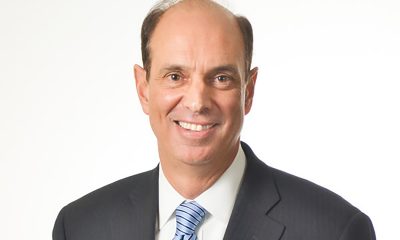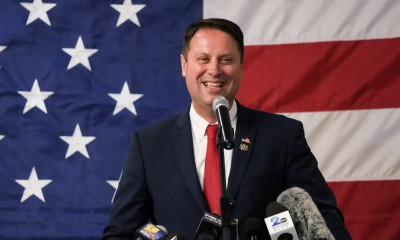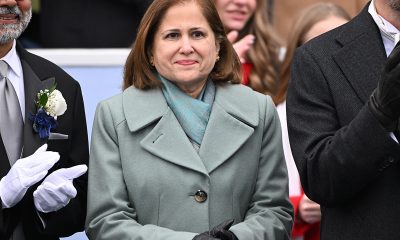Politics
White House says U.S. ‘not involved’ in detention of Greenwald’s partner
White House won’t rule out whether U.S. obtained information from detention
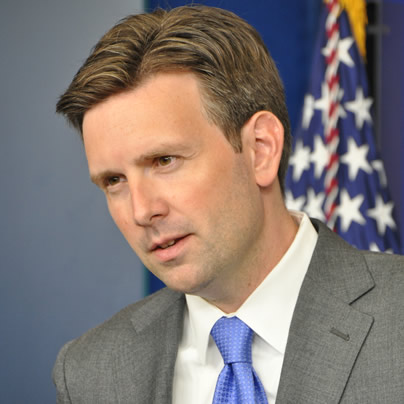
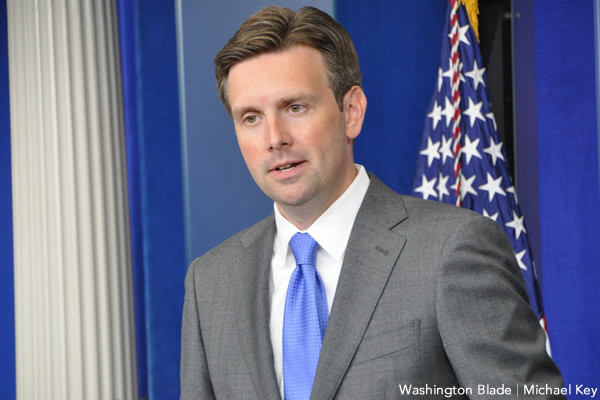
White House Principal Deputy Press Secretary Josh Earnest said the U.S. government had no involvement in the detention of Glenn Greenwald’s partner (Washington Blade photo by Michael Key).
White House Principal Deputy Press Secretary Josh Earnest asserted on Monday that the United States “was not involved” in the detention of Guardian journalist Glenn Greenwald’s partner in the United Kingdom — although he wouldn’t rule out the possibility that U.S. authorities obtained information as a result of the detention.
During a routine news conference on Monday, Earnest fielded questions from several reporters about the detention of David Miranda, 28, whom British authorities detained under an anti-terrorism law for nine hours in London on Sunday in addition to reportedly confiscating his laptop computer, cell phone, camera, memory sticks, DVDs and games consoles.
Miranda is the partner of Greenwald, who increased his notoriety as journalist after writing about the classified National Security Agency information leaked to him by intelligence contractor Edward Snowden.
In response to initial questioning from Reuters, Earnest asserted the U.S. government had no involvement in the British government’s decision to detain Miranda and directed additional questions to British law enforcement.
“The United States was not involved in that decision or in that action,” Earnest said. “So if you have questions about it, then I would refer you to the British government.”
Under later questioning on whether this detention was concerning to the White House, Earnest said he doesn’t have a specific reaction other than to say the U.S. government wasn’t involved.
However, as questioning continued from CNN’s Jessica Yellin, Earnest said the British government did give the United States a “heads-up” the detention would take place. Earnest also wouldn’t rule out the possibility that the U.S. government obtained information from the material that was confiscated as a result of this detention.
“I’m not in a position to do that right now, no,” Earnest said.
Asked by NBC News’ Chuck Todd whether the United States objected to the detention upon the heads up given by the British government, Earnest dodged.
“I’m not going to characterize the conversations between law enforcement officials in this country and law enforcement officials there other than to say that those conversations occurred and to point out the fact that this is a decision that they made on their own,” Earnest said.
Earnest also said he understands concerns among journalists about maintaining an independent media in the wake of leaks of security information and media reports the Justice Department has gathered personal information of reporters, but reiterated President Obama’s belief that media has a right to do its job.
“The President, I think, in the course of the debate, has made pretty clear his support for independent journalists, the important role that independent journalists have to play in a vibrant, democratic society like ours,” Earnest said. “He’s also talked about the responsibility of the government to protect the right of independent journalists to do their job.”
A partial transcript follows of questions that reporters asked Earnest about the detention of Greenwald’s partner:
REUTERS: British authorities detained David Miranda, who, as you know, is the partner of Glenn Greenwald, the journalist who wrote about the secrets that Edward Snowden revealed. Human rights groups have called this detention — which was for nine hours — harassment. The Brazilian government has said there was no justification for it. Was the United States government at all involved in this? And what is the justification for it, if so?
JOSH EARNEST: Well, Mark, what you’re referring to is a law enforcement action that was taken by the British government. The United States was not involved in that decision or in that action. So if you have questions about it, then I would refer you to the British government.
REUTERS: Does the U.S. feel that Miranda could have revealed information that’s useful in terms of finding Edward Snowden or pursuing its case against Snowden in any way?
EARNEST: Like I said, I’m not aware of any of the conversations that Mr. Miranda may have had with British law enforcement officials while he was detained. But that detention was a decision that was made by the British government and is something that if you have questions about you should ask them.
…
YAHOO! NEWS: Josh, you’ve talked about the Mubarak detention as being a Egyptian legal matter. You’ve talked about Morsi’s politically motivated detention. And then with regard to Mr. Greenwald’s partner, you called it a “mere law enforcement action.” Given that the White House has never been shy about criticizing detention policies overseas, do you have any concerns at all about the U.K.’s law enforcement actions in this case?
EARNEST: Well, what I can say is I don’t have a specific reaction other than to observe to you that this is a decision that was made by the British government and not one that was made at the request or with the involvement of the United States government.
YAHOO! NEWS: But you’re not going to go as far as to say it’s wrong or it’s cause for concern? You’re just separating yourself entirely from it?
EARNEST: Well, I’m separating — what I’m suggesting is that this is a decision that was made by the British government without the involvement and not at the request of the United States government. I think it’s simple as that.
Q: Just to follow then, does the U.S. government expect to be briefed on those — the questioning that took place in London, or the information that was taken away from Mr. Greenwald’s partner?
EARNEST: To be honest with you, Steve, I don’t have a way to characterize for you any of the conversations between the British government and the U.S. government on this matter other than to say that this is a decision that they made on their own and not at the request of the United States.
But in terms of the kinds of classified, confidential conversations that are ongoing between the U.S. and our allies in Britain, I’m not able to characterize that for you.
Q: But there are consultations on this matter taking place?
EARNEST: I’m telling you I’m not able to provide any insight into those conversations at all.
…
CNN: Can you state with authority that the U.S. government has not obtained material from the laptop the British authorities confiscated from Glenn Greenwald’s partner or from any of his personal devices they also confiscated?
EARNEST: I’m just not in a position to talk to you about the conversations between British law enforcement officials and American law enforcement officials.
CNN: So you can’t rule out that the U.S. has obtained this material?
EARNEST: I’m not in a position to do that right now, no.
CNN: You also didn’t condemn — the White House didn’t condemn the detention. Is the President pleased that he was condemned — I’m sorry, is the President pleased that he was detained?
EARNEST: Well, again, this is a law enforcement action that was taken by the British government, and this is something that that they did independent of our direction, as you would expect — that the British government is going to make law enforcement decisions that they determine are in the best interest of their country.
CNN: Was the White House consulted or given a heads-up in advance?
EARNEST: There was a heads-up that was provided by the British government. So, again, this is something that we had an indication was likely to occur, but it’s not something that we requested, and it’s something that was done specifically by the British law enforcement officials there.
CNN: Is it at all concerning to the President, this sort of a nine-hour detention?
EARNEST: Well, again, this is an independent British law enforcement decision that was made. I know the suggestion has been raised by some that this is an effort to intimidate journalists. And with all of you, we’ve been undergoing a pretty rigorous debate on a range of issues related to an independent media — an independent journalist covering the application of national security rules, questions about national security leaks and other classified or confidential information and policy.
The President, I think, in the course of the debate, has made pretty clear his support for independent journalists, the important role that independent journalists have to play in a vibrant, democratic society like ours. He’s also talked about the responsibility of the government to protect the right of independent journalists to do their job.
So that’s something that the President feels strongly about and has spoken candidly about in the past. But, again, if you have specific questions about this law enforcement decision that was made by the British government, you should direct your questions to my friends over there.
…
NBC NEWS: Why was the United States given a heads-up by the British government on this detention?
EARNEST: Again, that heads-up was provided by the British government, so you can direct that question to them.
NBC NEWS: Right. But was this heads-up given before he was detained or before it went public that he was detained?
EARNEST: Probably wouldn’t be a heads-up if they would have told us about it after they detained him.
NBC NEWS: So it’s fair to say they told you they were going to do this when they saw that he was on a manifest?
EARNEST: I think that is an accurate interpretation of what a heads-up is.
NBC NEWS: Is this gentleman on some sort of watch list for the United States? Can you look that up?
EARNEST: You’d have to check with the TSA because they maintain the watch list. And I don’t know if they’d tell you or not, but you can ask them.
NBC NEWS: If he’s on a watch list for the U.K., would it be safe to assume then that he’s been put on a watch list in the United States?
EARNEST: The level of coordination between counterterrorism and law enforcement officials in the U.K. and counterterrorism and law enforcement officials in the United States is very good. But in terms of who is on different watch lists and how our actions and their actions are coordinated is not something I’m in a position to talk about from here.
NBC NEWS: Did the United States government — when given the heads-up, did the United States government express any hesitancy about the U.K. doing it — about the U.K. government doing this?
EARNEST: Well, again, this is the British government making a decision based on British law, on British soil, about a British law enforcement action.
NBC NEWS: Did the United States, when given the heads-up, just said okay?
EARNEST: They gave us a heads-up, and this is something that they did not do at our direction and it’s not something that we were involved with. This is a decision that they made on their own.
NBC NEWS: Did the United States discourage the action?
EARNEST: I’m not going to characterize the conversations between law enforcement officials in this country and law enforcement officials there other than to say that those conversations occurred and to point out the fact that this is a decision that they made on their own.
NBC NEWS: But if the — is it fair to say if the United States had discouraged it, you’d tell us?
EARNEST: No, because I think it’s fair for you to determine that those kinds of law enforcement conversations are not ones that we’re going to talk about in public.
…
Q: Just quickly on the British detainment. When was the U.S. given a heads-up? How much — how far in advance?
EARNEST: I actually don’t have that information. I’m not sure how much of a heads-up they got. But in advance of his detention, American officials were informed.
Q: Do you know what American officials were informed? Or which department — was it the White House?
EARNEST: I don’t.
2026 Midterm Elections
LGBTQ Victory Fund looks beyond Washington for change in 2026
Vice President of Political Programs Daniel Hernández spoke with Blade

As the Trump-Vance administration enters its second year, LGBTQ people from around the country are running for public office amid fears of the removal of federal civil rights laws that could lead to rollbacks in protections.
The Washington Blade sat down with Daniel Hernández Jr., the newly made vice president of political programs for the LGBTQ Victory Fund, a nonpartisan political action committee dedicated to electing openly LGBTQ individuals to all levels of government, to discuss why now is more important than ever to actualize LGBTQ political power.
Hernández is often credited with saving the life of then-U.S. Rep. Gabrielle Giffords (D-Ariz.) while working as her 20-year-old intern in Tucson, Ariz., in 2011. He served on the Pima County School Board and in the Arizona House of Representatives from 2017-2023, advocating for LGBTQ rights, healthcare access, and education.
Founded in 1991, the Victory Fund was created by a group of prominent LGBTQ political voices, including Dallas gay rights activist William Waybourn and former Human Rights Campaign Fund Executive Director Vic Basile, who were inspired by the success of EMILY’s List, a PAC that works to elect Democratic women to office.
Since its founding, the Victory Fund has worked with LGBTQ advocates and LGBTQ-supportive donors who recognized the need to prepare LGBTQ people to run for office nationwide.
When asked where LGBTQ people and allies need to focus looking ahead, Hernández emphasized that 2026 will be won or lost at the state and local level.
“One of the bigger things that people may not be paying as close attention to as we really should is the impact of state and local races. Federal races are crucial, obviously, but the folks who are actually able to have an impact in a meaningful way right now are not the people in the U.S. House or Senate,” Hernández said. “It can take years before a bill even moves through Congress. Meanwhile, state and local leaders are the ones standing up and fighting for our rights today. Especially during this Trump administration, that’s where the real action is happening.”
He expanded on that point, saying that at this moment in the U.S. political landscape, statewide races matter far more than they are often given credit for — particularly as 2026 is a midterm year under President Donald Trump. People who win elected office in midterm years, Hernández explained, are many times viewed as legislators pushing back against the administration at the top.
“Looking at 2026 in particular, because it’s a midterm year, people sometimes forget just how many critical statewide races are on the ballot. We have people like Chris Mayes in Arizona, who won by less than 300 votes in a battleground state and is now running for reelection,” he said. “These are the races that protect democracy and protect people’s rights in real time. If we ignore them, we’re doing so at our own peril. Statewide offices are where so much power actually lives.”
Hernández also urged LGBTQ voters and donors to think critically about where their time, money, and energy are going — particularly as resources remain limited heading into 2026 and not every race is winnable.
“I think one thing we don’t do enough as a community is pause and ask whether our resources are actually going where they can have an impact. If someone is running against a Republican in a plus-20 Republican state that hasn’t elected a Democrat in decades, do I really need to give my limited resources there? Or does it make more sense to support candidates in competitive states like Arizona or Wisconsin? In 2026, we have to be more strategic, because our resources are not unlimited. Winning matters.”
That calculation, Hernández said, also means moving away from what he described as emotionally driven donations and toward a more deliberate strategy.
“Our community is incredible at rallying when we’re angry, and I call that ‘rage giving.’ Someone awful is in office, a challenger pops up, and we all open our wallets. But what we really need to be doing is asking where that money will actually move the needle. In 2026, it’s not enough to feel good about donating — we have to make sure those donations help candidates who can realistically win. That’s how we protect LGBTQ rights long term.”
Asked how the Victory Fund determines which candidates receive endorsements — especially amid a growing field of openly LGBTQ contenders — Hernández emphasized that viability is central to the organization’s approach in 2026.
“One of the things we’re really focused on in 2026 is viability. We’re not endorsing people who have a zero-percent chance of winning. We’re looking at candidates who are running strong campaigns, who have plans, who are fundraising, and who are doing the work. That’s important because our community deserves guidance it can trust. When you see a Victory endorsement, it means we believe that candidate can actually win.”
Hernández also pushed back on the long-standing notion that being openly LGBTQ is a political liability — an argument that has resurfaced amid right-wing attacks on LGBTQ candidates.
“There’s been this long-standing perception that being LGBTQ is a liability and that it can cost Democrats elections. But when you actually look at the data, that just isn’t true. The reality is that being LGBTQ is not a risk — it’s often a strength. Voters care about roads, health care, affordability, and jobs, not fear-based caricatures. In 2026, we’re seeing more LGBTQ candidates than ever because people understand that now.”
That shift, he added, has helped reframe what LGBTQ candidates are actually campaigning on — despite efforts by conservatives to reduce them to culture-war issues.
“The so-called ‘gay agenda’ is not bathrooms. It’s making sure people have access to health care, that roads are safe, and that families can afford to live. LGBTQ candidates are talking about the same bread-and-butter issues as everyone else. That’s why the idea that LGBTQ candidates cost elections just doesn’t hold up. In fact, we’re seeing them lead on some of the most important issues facing voters right now.”
As misinformation and fear-based narratives continue to dominate right-wing messaging, Hernández said openly LGBTQ elected officials play a crucial role in countering those attacks — both through policy and presence.
“First and foremost, any elected official’s responsibility is to their constituents. That’s what we’re seeing from LGBTQ officials who are focused on affordability, health care access, and consumer protections while Republicans obsess over culture-war nonsense,” Hernández said. “But there’s also a responsibility to be authentic. Being honest about who you are and why you fight matters. That authenticity cuts through fear-based disinformation.”
Looking ahead to 2026, Hernández pointed to transgender elected officials as a particular source of momentum and optimism, even amid intensified political attacks.
“Our trans elected officials are honestly at the forefront of some of the biggest battles we’re facing right now. Despite relentless attacks and vilification, they are still delivering results for their communities. That tells me something incredibly powerful about where the country is headed. Even in this political climate, trans leaders are winning and governing. That gives me a lot of hope for 2026.”
Ultimately, Hernández said the stakes of the upcoming cycle extend far beyond a single election, shaping the future of LGBTQ political leadership nationwide.
“The leaders we elect at the state and local level today are the members of Congress and senators of tomorrow. People don’t just wake up one day and run for Congress — they come from city councils, state legislatures, and school boards. That’s why 2026 is so important. If we invest now, we’re not just defending our rights in the moment, we’re building the next generation of LGBTQ leadership.”
Victory Fund’s endorsed candidates
Incumbents Endorsed: January 2026
- Helen Grant (they/them) – Norman City Council, Ward 4, Okla.
- Louie Minor (he/him) – Bell County Commission, Precinct 4, Texas
- Jonathan West (he/him) – Manchester Selectboard, Vt.
- George Leach (he/him) – Court of Common Pleas, Franklin County Judge, Ohio
- John Fredrickson (he/him) – Nebraska State Senate, District 20
- Ben Bowman (he/him) – Oregon House of Representatives, District 25
- Jeffrey Prang (he/him) – Los Angeles County Assessor, Calif.
- Amie Carter (she/her) – Sonoma County Superintendent of Schools, Calif.
- Elinor Levin (she/her) – Iowa House of Representatives, District 89
- Ken Carlson (he/him) – Contra Costa County Supervisor, District 4, Calif.
- Emma Pinter (she/her) – Adams County Commission, District 3, at-large, Colo.
- Justin Chenette (he/him) – York County Commission, District 3, Maine
- Kris Fair (he/him) – Maryland House of Delegates, District 3
- Jennifer Cornell (she/her) – Ann Arbor City Council, Ward 5, Mich.
- Darlene Martinez (she/her) – Constable, El Centro – Downtown Phoenix, Ariz.
- Brian Garcia (he/him) – Arizona House of Representatives, District 8
- Christian Phelps (he/him) – Wisconsin State Assembly, District 93
- Jack Patrick Lewis (he/him) – Massachusetts House of Representatives, 7th Middlesex
- Will Brownsberger (he/him) – Massachusetts State Senate, Suffolk and Middlesex Counties
- Julian Cyr (he/him) – Massachusetts State Senate, Cape & Islands District
- CM Hall (she/they) – Newport City Council, Ore.
- Jimmy Mack (he/him) – Southampton Town Trustee, N.Y.
- Michael Vargas (he/him) – Elk Grove USD Board of Education, Area 2, Calif.
- Lisa Grafstein (she/her) – North Carolina State Senate
- Hector Bustos (he/him) – Trustee, Santa Ana Unified School District, Calif.
Newly Endorsed Candidates – January 2026
- Kirk McPike (he/him) – Virginia House of Delegates, District 5
- Winn Decker (he/him) – North Carolina House of Representatives, District 37
- Jonathan Lambert-Melton (he/him) – Wake Co. Board of Commissioners, At-Large, N.C.
- Karen Stegman (she/her) – Orange County Board of Commissioners, At-Large, N.C.
- Landon Campbell (he/him) – Hays County Criminal District Attorney, Texas
- Christine Castillo (she/her) – Bexar County District Clerk, Texas
- Nicholas “Nico” Costilla (he/him) – Hays County Clerk, Texas
- Davis Mendoza Darusman (he/him) – Harris Co. Justice of the Peace, Pct. 5, Pl. 2, Texas
- Nicholas Palmer (he/him) – Justice, Fifth Court of Appeals, Texas
- José “Che-Che” Wilson (he/him) – Cook County Board of Commissioners, District 12, Ill.
- Sarah Bury (she/her) – Metropolitan Water Reclamation District Board of Commissioners, Ill.
For more information of the LGBTQ Victory Fund’s endorsments, qualifications, or on how to register to receive an endorsement, visit the organization’s website at victoryfund.org
Congress
New Equality Caucus vice chair endorses Equality Act, federal trans bill of rights
Salinas talks about her personal road to LGBTQ advocacy

Rep. Andrea Salinas, the new vice chair of the Equality Caucus, sat down with the Blade to discuss the battles ahead as she demands protections for LGBTQ Americans.
Salinas is no stranger to government service. The daughter of a Mexican immigrant, she graduated from the University of California, Berkeley, and soon became a valued member of multiple Democratic offices — including working as a congressional aide to U.S. Sen. Harry Reid (D-Nev.) and U.S. Reps. Pete Stark (D-Calif.) and Darlene Hooley (D-Ore.). From there, she served six years in the Oregon House of Representatives before being elected to Congress, representing areas south of Salem and parts of southern Portland. With her new role in the Equality Caucus, Salinas vows to push protections for LGBTQ Americans in every room she enters.
The Washington Blade spoke with Salinas last week following her leadership announcement to discuss what the role means to her, why she — as a straight woman— feels it is her duty to fight for LGBTQ protections, and how she views the current state of the country.
When asked why she decided to take on a leadership role within the Equality Caucus, Salinas explained that she was already doing the work — but that the timing of the caucus’s outreach, coupled with what she described as a growing threat posed by the Trump-Vance administration, made the moment feel especially urgent.
“I was actually asked to take on this role because of the work I’ve already been doing. I didn’t seek out a title— the Congressional Equality Caucus came to me, and I was honored by that,” the Oregon representative told the Blade. “I’ve been a lifetime advocate, first as a mother and then as a legislator. With Trump back in office and the shackles off, kids are vulnerable right now, and they’re being attacked. We need champions, and with or without a title, I was going to do this work anyway.”
That work includes passing LGBTQ-related education policy during her time in the Oregon House of Representatives, requiring the Oregon Department of Education to train teachers on how to better support LGBTQ students. She also backed legislation aimed at preventing LGBTQ-related bullying and harassment, while using her platform to ensure educators had the skills needed to address trauma in the classroom. Salinas also pushed for Oregon’s 2013 conversion therapy ban and played a role in defending it.
Salinas said her personal motivation for expanding and protecting LGBTQ rights is rooted in the experiences of her daughter, Amelia.
“My daughter is queer, and she has known who she is since she was a child,” Salinas said. “She presents very masculine, and I’ve had to advocate for her her entire life — from whispers on soccer sidelines to fears about using the bathroom when she was just three or four years old. That kind of bullying and harassment stays with you as a parent. It became part of who I am, part of my ‘mama bear’ advocacy. When I entered public office, continuing that fight was the most natural thing in the world.”
That “mama bear” advocacy, she said, now extends far beyond her own family.
“Across this country, kids are vulnerable right now, and Trump is attacking them,” she said. “My daughter was devastated after the 2024 election— she said, ‘They’re coming after us,’ and she was right. That fear is real, especially for transgender youth. Civil rights should be expanding, not being stripped away from certain communities. That’s why this fight feels so urgent.”
Since returning to the White House in 2024, the Trump administration has moved to roll back anti-discrimination protections, particularly those affecting transgender people. These efforts include barring transgender people from serving openly in the military, blocking access to gender-affirming medical care in federal health programs, challenging state laws that protect transgender students on religious grounds, and arguing that the Constitution entitles employers to discriminate against LGBTQ people based on religious beliefs — even in states with nondiscrimination laws.
For Salinas, the Equality Caucus’s most urgent task under the Trump-Vance administration is advancing what she called a long-sought but non-negotiable priority: the Equality Act.
The Equality Act would add explicit protections based on sexual orientation and gender identity to federal law. Despite more than five decades of debate on Capitol Hill, no version of the bill has yet become law.
“We have to keep pushing the Equality Act— there’s no way around that. No one should be discriminated against in housing, employment, credit, or healthcare because of who they are,” Salinas said. “Republicans are making LGBTQ identity a political wedge because they think it’s expedient, and that’s unacceptable. Sexual orientation and gender identity should not matter in determining someone’s access to opportunity. Yet here we are, still having to fight for that basic principle.”
Salinas added that advancing legislation like the Equality Act requires compassion— even when that compassion is not returned— and a commitment to education.
“We have to meet people where they are— Democrats, Republicans, independents, all of them. Until you know a family, or understand someone’s lived experience, it can feel abstract and overwhelming,” she said. “Education, compassion, and empathy are essential to moving the dial. When people understand this is about human rights, not politics, conversations start to change. That’s how we build broader support.”
She also emphasized the need for a federal transgender bill of rights, which would provide explicit protections for transgender Americans amid what she described as an increasingly hostile federal environment.
“A transgender bill of rights would clarify that discrimination against transgender and nonbinary people is illegal — in employment, housing, credit, and healthcare,” Salinas said. “What’s happening right now, with efforts to criminalize doctors for providing evidence-based care, is unheard of and dangerous. We also need to ban conversion therapy nationwide, because states are increasingly trying to undo those protections through the courts. These safeguards are about ensuring people can live safely and with dignity. That should not be controversial.”
Mental health is another central focus of Salinas’s work. She said ensuring children have access to support— particularly LGBTQ youth— is critical to their long-term wellbeing.
After the Trump administration eliminated the LGBTQ-specific option from the 988 Suicide and Crisis Lifeline, Salinas said her reaction was one of outrage.
“When Trump shut down the 988 press-three option for LGBTQ youth, I was apoplectic,” she said. “It is one of the simplest, most upstream ways to save lives, and it felt arbitrary, cruel, and inhumane. We know the suicide risk among transgender youth is far higher than among non-LGBTQ kids. Connecting them with someone who understands their experience can be life-saving. This should be bipartisan, and I’m going to keep pushing to restore it.”
“You cannot be what you cannot see….” she added while reflecting on the handful of LGBTQ leaders who have— and continue to— navigate the halls of Congress to protect their community. “When Sarah McBride was elected, my daughter met with her and walked out glowing… joyful, hopeful, and excited about the future. That kind of representation changes lives. Electing LGBTQ leaders changes the trajectory for people across the country. Grassroots organizing and electoral power go hand in hand, and we need both.”
With Salinas’s experience in both the Oregon House of Representatives and the U.S. House of Representatives, she said that while one arena may reach more people, change often begins locally, especially when combating anti-LGBTQ attacks.
“I’ve seen how misinformation fuels fear at the local level— whether it’s school board fights or bathroom debates rooted in baseless claims. There is no data to support these scare tactics,” she said, echoing her past work with the Oregon Department of Education. “What actually helps is facts, education, and training teachers to better support LGBTQ students. I passed legislation in Oregon to give educators real tools to prevent bullying and harassment. That kind of work matters just as much as what we do in Congress.”
Despite just being named vice chair of the Equality Caucus, the Blade asked Salinas what legacy she hopes to leave, particularly when it comes to LGBTQ advocacy.
“I want people to be able to live authentically, without fear from their government or their neighbors. That means passing real legislation— the Equality Act and a transgender bill of rights— so protections are not dependent on who’s in power. Civil and human rights are meant to expand, not contract.
“I’ve been doing this work since I became a mother, and I’ll keep doing it for as long as it takes. My daughter deserves it, and so does every LGBTQ person in this country.”
Congress
McBride, other US lawmakers travel to Denmark
Trump’s demand for Greenland’s annexation overshadowed trip

Delaware Congresswoman Sarah McBride is among the 11 members of Congress who traveled to Denmark over the past weekend amid President Donald Trump’s continued calls for the U.S. to take control of Greenland.
McBride, the first openly transgender person elected to Congress, traveled to Copenhagen, the Danish capital, with U.S. Sens. Chris Coons (D-Del.), Thom Tillis (R-N.C.), Jeanne Shaheen (D-N.H.), Dick Durbin (D-Ill.), and Lisa Murkowski (R-Alaska) and U.S. Reps. Steny Hoyer (D-Md.), Gregory Meeks (D-N.Y.), Madeleine Dean (D-Pa.), Don Bacon (R-Neb.), and Sarah Jacobs (D-Calif.). The lawmakers met with Danish Prime Minister Mette Frederiksen and Greenlandic MP Pipaluk Lynge, among others.
“I’m grateful to Sen. Coons for his leadership in bringing together a bipartisan, bicameral delegation to reaffirm our support in Congress for our NATO ally, Denmark,” said McBride in a press release that detailed the trip. “Delaware understands that our security and prosperity depend on strong partnerships rooted in mutual respect, sovereignty, and self-determination. At a time of growing global instability, this trip could not be more poignant.”
Greenland is a self-governing territory of Denmark with a population of less than 60,000 people. Trump maintains the U.S. needs to control the mineral-rich island in the Arctic Ocean between Europe and North America because of national security.
The Associated Press notes thousands of people on Saturday in Nuuk, the Greenlandic capital, protested against Trump. British Prime Minister Keir Starmer is among those who have criticized Trump over his suggestion the U.S. would impose tariffs against countries that do not support U.S. annexation of Greenland.
A poll that Sermitsiaq, a Greenlandic newspaper, and Berlingske, a Danish newspaper, commissioned last January indicates 85 percent do not want Greenland to become part of the U.S. The pro-independence Demokraatit party won parliamentary elections that took place on March 12, 2025.
“At this critical juncture for our countries, our message was clear as members of Congress: we value the U.S.-Denmark partnership, the NATO alliance, and the right of Greenlanders to self-determination,” said McBride on Sunday in a Facebook post that contained pictures of her and her fellow lawmakers meeting with their Danish and Greenlandic counterparts.

















